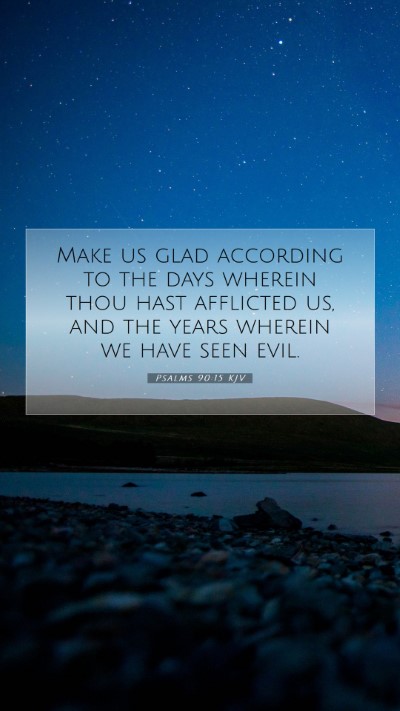Psalms 90:15 - Understanding the Verse
The verse Psalms 90:15 states: "Make us glad according to the days wherein thou hast afflicted us, and the years wherein we have seen evil." This verse presents a poignant plea for joy and consolation amidst past afflictions. Below, we delve into the Bible verse meanings and interpretations to gain a clearer understanding of its significance.
Contextual Background
The Psalms, attributed primarily to Moses in this chapter, reflect on the temporality and frailty of human life. Here, Moses acknowledges the afflictions faced by the people, invoking God’s mercy and the desire for a restoration of joy. This plea captures the essence of human experience: the coexistence of suffering and the longing for divine joy.
Insights from Commentaries
-
Matthew Henry’s Commentary
Henry emphasizes the contrast between the sorrowful days and the request for gladness. He notes that this petition reflects a deep understanding of life’s brevity. The plea is both a recognition of God’s discipline and an appeal for renewed joy, encapsulating a major theme in human existence—seeking relief from suffering.
-
Albert Barnes’ Notes on the Bible
Barnes elaborates on the concept of divine favor being proportionate to the days of affliction, highlighting that true joy may often follow the hardships of life. He indicates that the people seek not just a return to happiness but a profound transformation through God’s grace. This request also signifies that acknowledgment of God’s past helps to frame current and future experiences with hope.
-
Adam Clarke’s Commentary
Clarke points out the spiritual implications of joy following tribulation, suggesting that they are an interconnected part of the human condition. The verse serves as a reminder that afflictions are not meaningless but serve a higher purpose in shaping faith. Clarke emphasizes the importance of God’s grace in restoring joy to the afflicted soul and its vital role in spiritual growth.
Thematic Elements
This verse evokes several critical themes that resonate throughout the Bible:
- Divine Affliction: Recognizing that suffering and trials may be part of God’s plan.
- Restoration of Joy: God's grace can lead to renewed happiness, a common biblical theme.
- Temporal vs. Eternal: The contrast between the fleeting nature of life and the eternal nature of God’s love.
Cross References
- Psalm 30:5: "For his anger endureth but a moment; in his favor is life: weeping may endure for a night, but joy cometh in the morning."
- Isaiah 61:3: "To appoint unto them that mourn in Zion, to give unto them beauty for ashes, the oil of joy for mourning, the garment of praise for the spirit of heaviness."
- 2 Corinthians 4:17: "For our light affliction, which is but for a moment, worketh for us a far more exceeding and eternal weight of glory."
Application in Life
How can we apply the meaning of Psalms 90:15 in our daily lives? Here are some insights:
- Acknowledge Suffering: Understanding that trials are part of the journey encourages us to look for the lessons within.
- Seek God’s Joy: In moments of despair, actively seek joy through prayer and reflection, trusting in God’s plan.
- Extend Compassion: Share your experiences of overcoming affliction with others, providing comfort and hope.
Conclusion
Psalms 90:15 encapsulates the human condition—our afflictions shape us, but they are not the entirety of our existence. The joy that follows hardship is a testament to God’s unchanging nature and mercy. In studying and reflecting upon this verse, we find a deeper understanding of Scripture and a foundation to build resilience against life’s challenges.
This verse beckons us to engage in Bible study and participate in Bible study groups, where we can further explore the meaning of Bible verses together, finding community and collective understanding in our journeys of faith.


